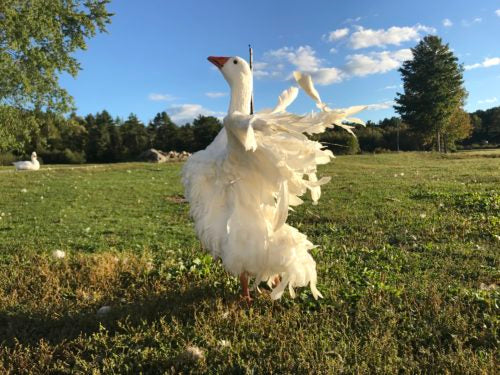Which Goose and Duck Breeds are Right for Your Farm?
Back to blog
It's time to start thinking about spring birds! If you are considering adding waterfowl to your flock, here are few tips on which duck breeds and goose breeds to consider, and what these fun and entertaining birds may bring to your farm, homestead, or backyard.

Duck Breeds vs. Goose Breeds
My Pet Chicken now offers all kinds of day-old waterfowl, so the choices can be overwhelming! The first choice you may find yourself considering is, does my flock need ducks or geese? While both are a pleasure to raise, they bring very different attributes to the barnyard.
Ducks are primarily raised for eggs, meat, or as pets. Geese are primarily raised for meat, as guardians for smaller birds, as pets, or for their weeding abilities. There are immediate differences in size and attitude. While many geese can be friendly and even loving pets, they are much larger and more intimidating than ducks. This can be an asset if you're using them to guard smaller birds, but it can be a problem for a flock with space constraints. Ducks fit perfectly in the backyard and are friendly, funny birds for the family - but, if you have a ducks and a predator problem in your area, you may consider ducks with a guardian goose.
About Goose Breeds

Many people immediately think of geese as aggressive, hissing, and sometimes downright scary. I'm happy to say that they are none of the above if raised by hand. Like ducklings, goslings will imprint on the person who raises them and follow them around as a 'mother goose' when young. While they may outgrow this adoration, hand-raised goslings remain friendly to people.
If you are raising a single goose as a pet they will remain dedicated to you for their entire lives - but this can present problems as they are extremely attached to their owners.
For those raising geese to guard a small flock of chickens or ducks, you'll want one or two geese that can sound an alarm at trouble or scare off a small predator. Guard geese are especially talented at sighting trouble from the sky and protecting their flocks, but with more than two geese they may lose interest in the ducks or chickens and go off by themselves. A large flock of geese can be good guard animals simply by their intimidating presence, but they won't care as much about protecting other birds.
When choosing geese, breed selection is extremely important. Their behaviors can vary greatly depending on the breeds. Chinese geese are loud, active foragers and great guardians - but bad for close neighbors because of their high pitched voices. Breeds like Buffs and Toulouse may be better in a more suburban setting, and Roman geese and Sebastopols are smaller breeds that can still be effective guardians.
About Duck Breeds

Ducks are a great alternative to backyard chickens, or an addition to a chicken flock. Adorable and full of personality, ducks can be happy in a relatively small coop and are not as noisy as geese. They do require extra water for bathing and they can be rather messy, but overall ducks are easy keepers who lay tasty eggs year round.
There are many duck breeds, and as with geese, the different varieties will fit differently into your farm. Runner ducks are a popular, upright breed that are especially active foragers, and perfect if you want help with bugs and slugs around your garden. Heavy weight duck breeds like the Pekins won't fly off, but some of the smaller and more sporty breeds, such as Khaki Campbells and Mallards, can fly and may need their wings clipped if you do not want them seeking out the nearest pond or lake.
Once you've decided what works for your farm, get your orders in! There is nothing better than a box of peeping, fluffy ducklings or goslings arriving in the spring, and the most popular breeds will sometimes sell out months in advance.
I'll be posting more about how to set up a brooder for your waterfowl to ensure they grow up happy and healthy very soon.
Kirsten Lie-Nielsen keeps chickens, a gaggle of geese and goats at her farm in Liberty, Maine. She and her partner are rebuilding an 1820s farmhouse while turning overgrown fields back into orchards and gardens. When not working on the farm and tending her geese and other animals, Kirsten writes about her experiences at her blog and has written two books, The Modern Homesteader's Guide to Keeping Geese as well as So You Want to Be a Modern Homesteader?: All the Dirt on Living the Good Life. Follow her on Instagram: http://instagram.com/hostilevalleyliving or visit her blog at hostilevalleyliving.com.




1 comment
Interested in having geese